What Are the Risks of Not Socializing Your Cat?

The Risks of Not Socializing Your Cat:
Aggression, stress, and health issues can result from isolation in cats.
Increased Aggression and Hostility
Not socializing a cat can lead to heightened levels of aggression and hostility towards both humans and other animals. This lack of socialization can result in a cat feeling fearful or threatened in various situations, causing them to react aggressively as a defense mechanism. To address these behavioral issues, behavior modification techniques can be utilized to help the cat adapt to social interactions in a positive way.
Effective behavior modification involves using training techniques that focus on positive reinforcement to encourage desirable behaviors while discouraging negative ones. By rewarding calm and sociable behavior with treats or praise, cats can learn to associate positive outcomes with social interactions, reducing their aggressive tendencies over time. Consistency and patience are key when implementing behavior modification strategies, as cats may take time to adjust to new ways of interacting with humans and other animals.
Training techniques such as clicker training or desensitization can also be beneficial in teaching cats how to respond appropriately in various social situations, ultimately fostering a more harmonious relationship between the cat and its environment.
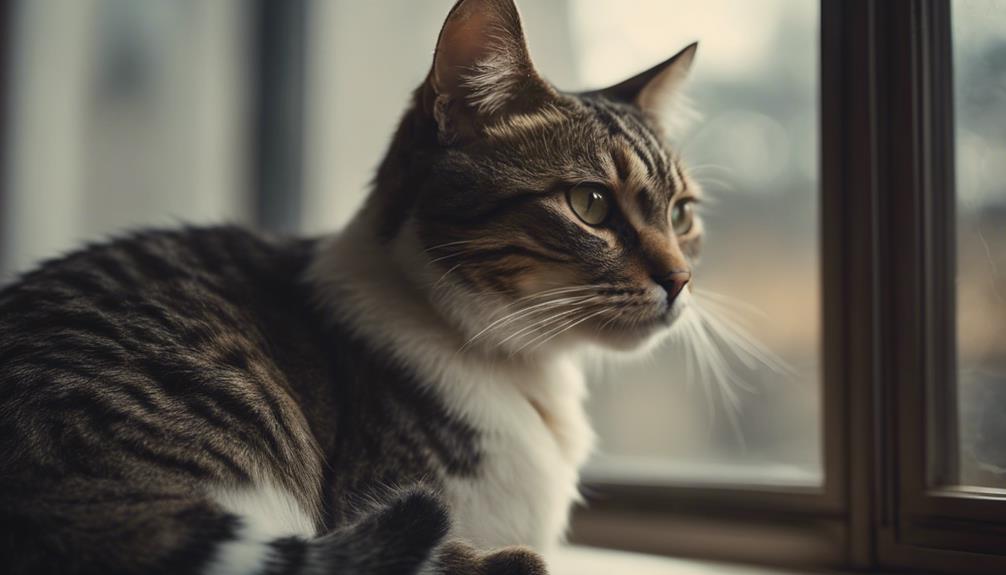
Failing to socialize a cat adequately can lead to increased levels of anxiety and stress-related issues in the feline. When a cat lacks proper socialization, they may experience heightened anxiety levels, which can manifest in various stress-related problems. Here are some ways in which inadequate socialization can impact a cat's mental well-being:
- Increased Anxiety: Cats that aren't socialized may exhibit signs of anxiety such as excessive grooming, hiding, or aggression towards humans or other pets.
- Stress-Related Health Issues: Chronic stress due to lack of socialization can lead to health problems like digestive issues, lower immune function, and obesity.
- Lack of Mental Stimulation: Without socialization, cats miss out on crucial mental stimulation, leading to boredom and potential cognitive decline.
- Absence of Behavioral Enrichment: Socialization provides opportunities for cats to engage in natural behaviors, and without it, they may develop behavioral problems like excessive meowing or destructive tendencies.
It is essential to prioritize socialization to ensure your cat's mental and emotional well-being.
Fear of Humans and Other Animals
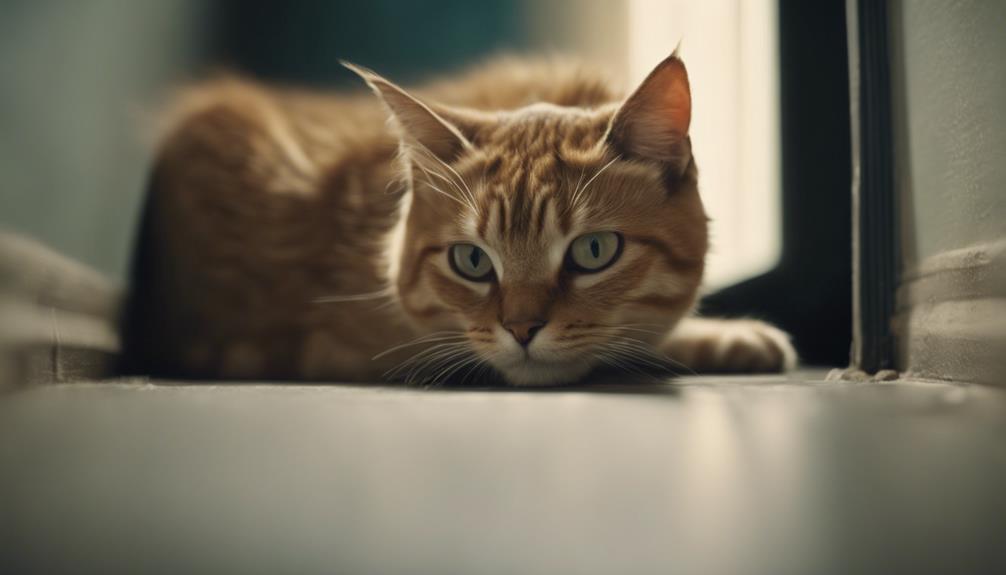
Not socializing a cat can lead to a deep-seated fear of humans and other animals. This fear can manifest in aggressive behavior and cause stress for the cat.
Socialization is crucial in preventing fear, building confidence, and fostering trust in feline companions.
Socialization Prevents Fear
Socializing your cat from a young age can help prevent the development of fear towards humans and other animals. This early exposure is crucial in shaping their behavior and interactions. Here are some ways socialization can prevent fear:
- Positive experiences: Regular positive interactions with humans and animals can create a sense of security and trust in your cat.
- Reduced stress: Socialized cats are less likely to feel stressed or anxious in new situations, leading to a more relaxed and confident demeanor.
- Improved communication: Socialization enhances your cat's ability to communicate effectively, reducing misunderstandings that could lead to fear-based reactions.
- Healthy boundaries: Cats learn appropriate boundaries through socialization, helping them navigate social interactions without feeling threatened or fearful.
Builds Confidence and Trust
Building confidence and trust in cats towards humans and other animals is essential for their overall well-being and social adaptability. Building trust and boosting confidence in cats can lead to enhanced relationships and increased sociability.
Cats that lack socialization may exhibit fear towards humans and other animals, hindering their ability to interact positively in various situations. By socializing cats early on and consistently exposing them to different people, animals, and environments, their confidence grows, allowing them to feel more secure and at ease in unfamiliar settings.
This increased confidence and trust not only benefit the cat's mental and emotional well-being but also contribute to healthier relationships with their human companions and other pets, fostering a more harmonious and fulfilling life for the cat.
Reduces Aggressive Behavior
Regular socialization of cats helps alleviate aggressive behavior stemming from fear towards humans and other animals. Cats that lack proper socialization may exhibit aggressive tendencies due to their fear of unfamiliar situations. Here are some ways in which socialization can help reduce aggressive behavior in cats:
- Behavior Modification: Through socialization, cats can learn to modify their responses to fear-inducing stimuli.
- Training Techniques: Positive reinforcement training techniques can be used to teach cats appropriate behaviors when interacting with humans and other animals.
- Desensitization: Gradual exposure to new people and animals can help cats become less fearful and, in turn, less aggressive.
- Increased Confidence: Socialization can boost a cat's confidence, reducing the need to resort to aggression as a defense mechanism.
Destructive Behavior at Home
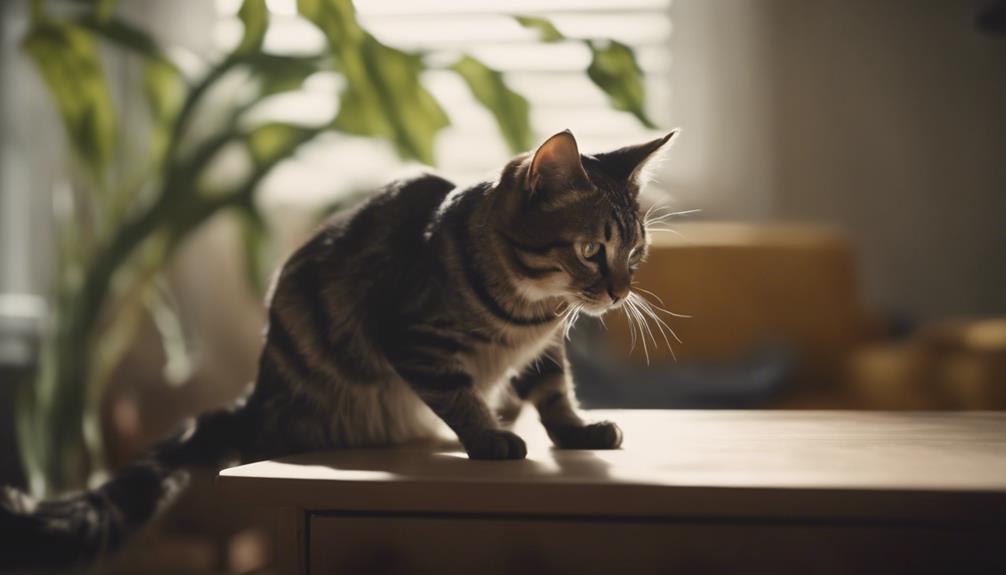
Cats that aren't properly socialized may exhibit destructive behaviors at home, such as scratching furniture and spraying urine. These actions can be frustrating for pet owners and lead to damage within the household.
Understanding the importance of socialization can help address and prevent these unwanted behaviors.
Furniture Scratching
One common issue cat owners face is the destructive behavior of furniture scratching, which can cause damage to valuable items in the home. To address this behavior, cat owners can implement the following strategies:
- Provide Scratching Posts: Offer appropriate scratching outlets to redirect the cat's behavior away from furniture.
- Use Deterrents: Utilize deterrent sprays or covers on furniture to discourage scratching.
- Trim Nails: Regular nail trimming can reduce the damage caused by scratching.
- Positive Reinforcement: Reward the cat for using scratching posts to reinforce this desirable behavior.
Urine Spraying
Urine spraying, a common behavior in unneutered male cats, can be a distressing issue for cat owners due to the strong odor and potential damage it can cause to furniture and walls. This behavior, often triggered by territorial instincts or stress, can be challenging to address.
Behavioral modification techniques such as providing enough litter boxes, keeping them clean, and creating a calming environment may help reduce spraying. Additionally, training techniques like positive reinforcement can encourage desirable behaviors and deter spraying.
Seeking advice from a veterinarian or animal behaviorist is advisable to rule out any underlying medical conditions contributing to this behavior. With patience, consistency, and understanding, cat owners can work towards minimizing urine spraying and fostering a harmonious home environment for both cats and humans.
Difficulty in Handling and Grooming
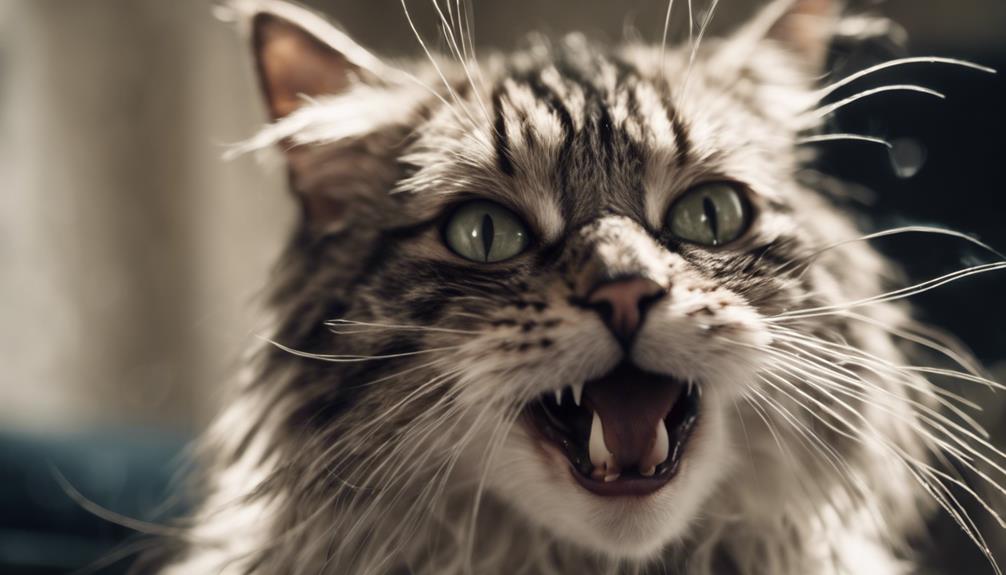
Why is it important to consider the difficulty in handling and grooming a cat who hasn't been socialized properly? Cats that lack socialization may present challenges when it comes to grooming and handling, impacting their overall well-being and the bond with their owners. Here are some key points to consider:
- Trust Building: Cats that haven't been socialized may struggle to trust humans, making grooming sessions stressful for both the cat and the owner. Building trust through patience and positive reinforcement is essential.
- Handling Techniques: Proper handling is crucial for grooming and maintaining a cat's health. Without socialization, cats may resist handling, making it difficult to trim nails, check for skin issues, or administer medication.
- Increased Stress: Cats that haven't been socialized may become anxious when handled or groomed, leading to increased stress levels that can impact their health and behavior.
- Risk of Aggression: Without proper socialization, cats may exhibit aggressive behaviors when handled or groomed, posing risks of scratches or bites to their owners.
Limited Adaptability to New Environments
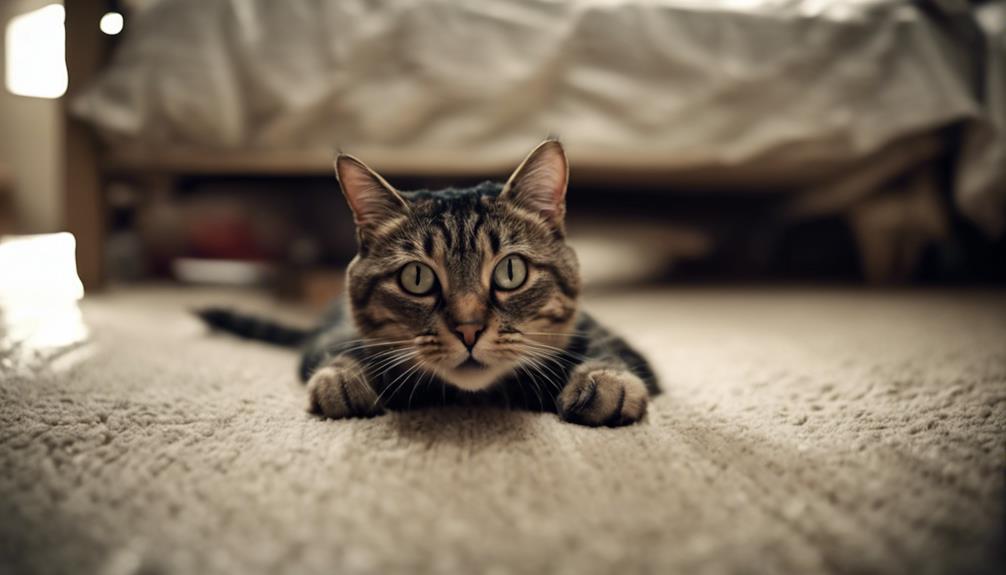
Limited socialization in cats can lead to challenges in adapting to new environments, affecting their overall well-being and comfort levels. When cats aren't adequately socialized, they may exhibit behavioral problems when faced with environmental changes. Cats that aren't used to interacting with different people, animals, or situations can become easily stressed or anxious when introduced to new surroundings. This can manifest in behaviors such as hiding, aggression, excessive meowing, or even inappropriate elimination.
Limited adaptability to new environments can be particularly concerning when changes are unavoidable, such as moving to a new home or introducing a new pet. Cats that struggle with adapting due to poor socialization may find it harder to cope with these transitions, leading to increased stress levels and potential health issues down the line.
Health Problems Due to Stress
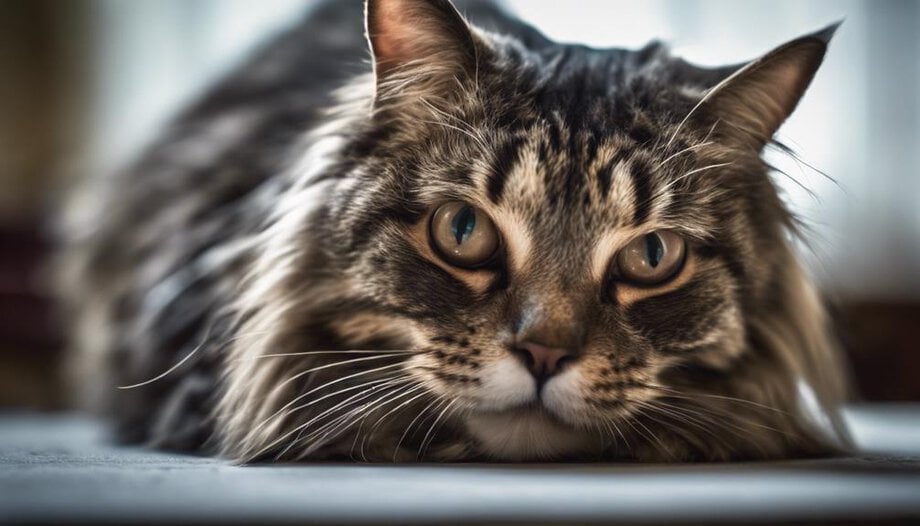
Inadequate socialization in cats can lead to a range of health problems stemming from stress. Cats, as social creatures, require interaction and stimulation to maintain their well-being. When deprived of socialization, they can experience significant stress, which may manifest in various health issues.
- Mental Health: Cats that lack socialization may suffer from mental health problems such as anxiety and depression. The absence of social interaction can lead to feelings of loneliness and isolation in cats, impacting their overall mental well-being.
- Behavioral Problems: Stress due to inadequate socialization can result in behavioral issues in cats. They may exhibit behaviors like aggression, excessive grooming, or avoidance, which are all signs of underlying stress and discomfort.
- Physical Health Complications: Prolonged stress from lack of socialization can weaken the immune system of cats, making them more susceptible to illnesses and infections.
- Reduced Quality of Life: Ultimately, the cumulative effect of health problems stemming from stress can significantly reduce a cat's quality of life, affecting their happiness and overall vitality.
Frequently Asked Questions
How Can I Help My Cat Socialize if They Are Already Showing Signs of Aggression and Hostility?
If a cat displays aggression and hostility, behavior modification techniques and professional help can assist in socialization. Training and patience are key. Seek guidance on socialization techniques from experts to create a safe and harmonious environment for all.
To help reduce anxiety and stress in an unsocialized cat, one can incorporate enrichment activities, behavior modification, positive reinforcement, and desensitization techniques. These methods can gradually improve the cat's comfort and social skills.
What Steps Can I Take to Help My Cat Overcome Their Fear of Humans and Other Animals?
To help a cat overcome fear of humans and other animals, behavior modification techniques can be effective. Using positive reinforcement, gradual exposure, and patience, one can slowly build trust and confidence in the cat, improving socialization skills over time.
To prevent destructive behavior in an unsocialized cat, engage in play therapy and behavioral training. Implement enrichment activities and use positive reinforcement to encourage positive behaviors. Consistent efforts will help improve the cat's behavior and well-being.
When facing handling challenges or grooming issues with an unsocialized cat, it's crucial to prioritize trust building and engage in socialization exercises. Patience and understanding are key ingredients in helping your feline friend feel safe and secure.











